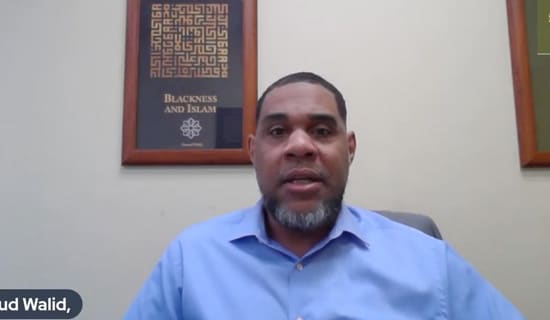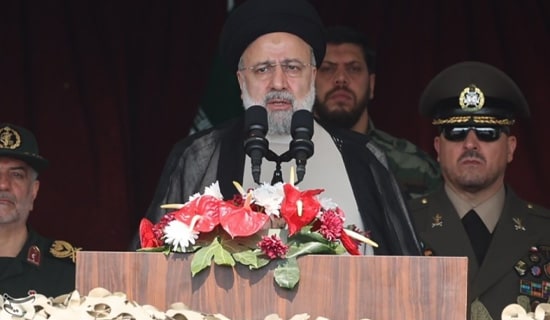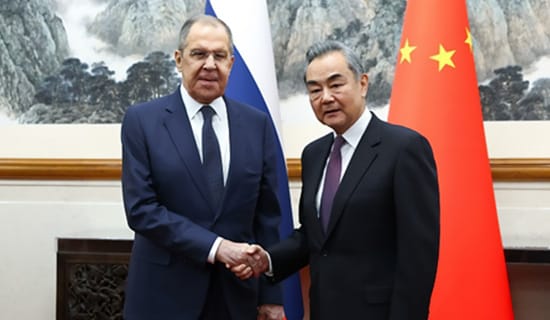Russia This Week is a weekly review by the MEMRI Russian Media Studies Project, covering the latest Russia-related news and analysis from media in Russia, the Caucasus, Central Asia, and Eastern Europe.

Russia,ד Ambassador to the U.S. Anatoly Antonov: "All the effortsto use these sanctions against Russia, against our President, are doomed to failure. We are not afraid of sanctions. We will survive."
(Ria.ru, October 10, 2017)
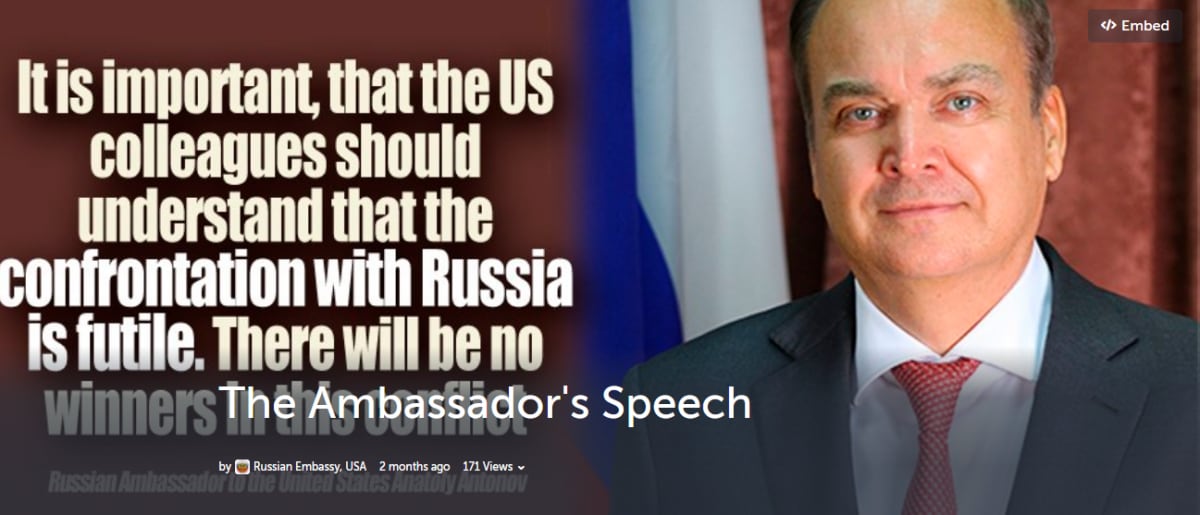
Russian Ambassador to the U.S. Anatoly Antonov (Source: Storify.com/RusEmbUSA)
Russian Deputy Foreign Minister Sergey Ryabkov said: "The United States is more and more sinking into the sanctions craze, it has no other levers of carrying out foreign policy, besides the sanctions pressure against those who, due to some reasons, do not satisfy Washington."
(Tass.com, November 1, 2017)
Leonid Slutsky, Chairman of the State Duma Committee on International Affairs, said: "The U.S, as in the past,. continues to contain Russia by using political leverage in order to promote their economic interests in various fields. Will it affect U.S.-Russia relations? Definitely, it won't improve them."
(Ria.ru, October 27, 2017)
Pushkov's Tweet Storm
Senator Alexey Pushkov (@Alexey_Pushkov) posted in his Twitter account: "The U.S. continue to issue sanctions in an anti-Russian ecstasy, without paying attention that sanctions lead to no result and do not change Russia's course. Meaningless convulsions."
(Twitter.com/Alexey_Pushkov, October 27, 2017)
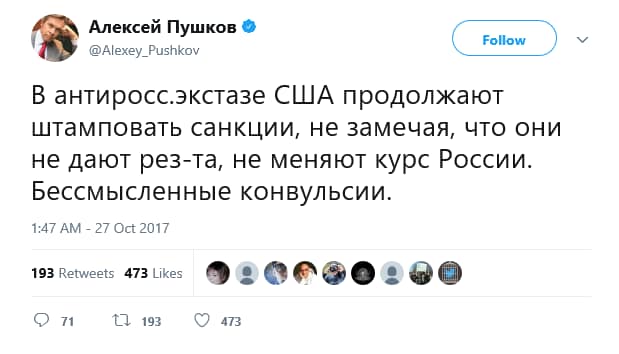
(Twitter.com/Alexey_Pushkov, October 27, 2017)
In The News
U.S.-Russia Media War
Russian Deputy Foreign Minister Sergey Ryabkov said:
"The existing legislative and regulatory base allows for declaring [foreign] media operating in Russia, if need be, as foreign agents or as undesirable organizations for directly conducting their countries' policies. We know all names of such media… Whether this will happen or not depends on if unacceptable pressure on Russian media in the United States continues."
(Tass.com, November 2, 2017)
At a meeting of the Federation Council working group on monitoring external activities aimed at interfering in Russia's affairs, Russian media watchdog Roskomnadzor head Alexander Zharov said: "Formally, the U.S. media outlets abide by the law. But if we thoroughly assess Washington's influence on the media working in Russia, then Roskomnadzor definitely has enough mechanisms to give an adequate and tit-for-tat response. If the unprecedented pressure that the RT channel and Sputnik agency have been facing goes on, then we have all the capabilities to respond."
(Tass.com, November 1, 2017)
The Russian news agency TASS further reported: "In late October, Roskomnadzor submitted to the Federation Council its proposals concerning possible changes in the Russian legislation, which would prove to be a proportionate response to the oppression that the Russian media have been facing abroad, as well as to attempts at using the media for influencing the political and economic situation in Russia. Roskomnadzor deputy head Vadim Subbotin announced this plan at a meeting of the working group on drafting proposals for legislation improvements under the Federation Council's temporary commission for the protection of state sovereignty."
(Tass.com, November 1, 2017)
Senator Kosachev: '[Twitter] Is Dependent In Its Actions, It Is Highly Politicized'
Senator Konstantin Kosachev chairman of the Federation Council Committee on International Affairs, deleted his own Twitter account. The decision was taken after Twitter off-boarded advertising from all the accounts owned by RT and the Sputnik news agency. Kosachev explained: "I'm a Twitter user myself and until now I relied on the independence of this website. Right now I see that, apparently, it is dependent in its actions, it is highly politicized. That's why I have made a decision to unsubscribe from Twitter and to delete my account there. You may treat it as a sign of solidarity with RT and Sputnik, if you wish."
(Tass.com, October 27, 2017)
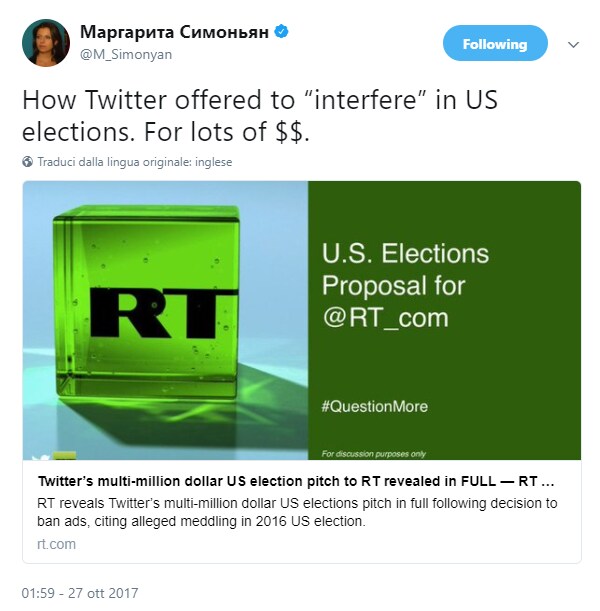
RT Editor-in-chief Margarita Simonyan's tweet: "How Twitter offered to 'interfere' in U.S. elections. For lots of $$ [dollars]". The tweet is linked to an RT article, titled "Twitter’s Multi-Million Dollar U.S. Election Pitch To RT Revealed In FULL" (Source: Twitter.com/M_Simonyan, October 27, 2017)
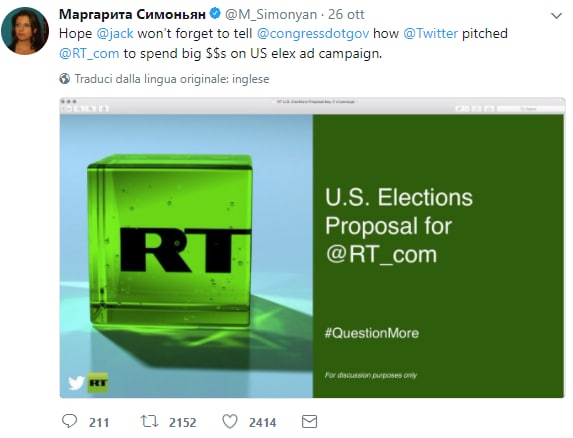
Simonyan's tweet: "Hope @jack [Jack Dorsey, co-founder and CEO of Twitter] won't forget to tell @congressdotgov how @Twitter pitched @RT_com to spend big $$s on U.S. elex [elections] ad campaign]" (Source: Twitter.com/M_Simonyan, October 26, 2017)
Russia MFA Spokesperson Zakharova: 'Twitter's Ban Is Evidence Of Its Failure As A Business And Its Absolute Dependence on the U.S. Security Establishment'
During her weekly briefing, Russian Foreign Ministry Spokesperson Maria Zakharova commented: "As you know, the Federation Council held one more hearing on the efforts to force the Russia Today (RT) television network and the Sputnik news agency out of the United States, or more precisely, the decision by Twitter to block RT and Sputnik ads. I would like to say a few words on this subject. As you know, the decision to off-board advertising from all accounts owned by RT and Sputnik was adopted by the micro-blogging social networking service Twitter on October 26.
"As members of the Twitter community, we are closely monitoring public response to this decision. We see that the number of those who are dissatisfied or who do not understand Twitter's absurd actions is growing. It has been pointed out quite reasonably that the censors of this social network close their eyes to the hundreds of openly extremist or fascist accounts and are putting pressure exclusively on Russian media outlets.
"We have also taken note of statements made by US and European experts and politicians, who have denounced this Twitter decision, which they have described as yet another infringement on the freedom of expression and enterprise.
"I would like to draw your attention to a crucial fact. In 2016, Twitter representatives forwarded a business proposal on cooperation in advertising to RT worth between $1.5 and $3.3 million. This happened before and during the U.S. presidential campaign. Despite RT's unwillingness to accept this proposal, Twitter continued to press on and prepared a presentation for the RT staff. However, RT rejected that proposal for purely commercial reasons. You can find out what happened after that from a statement made by Margarita Simonyan, the network's editor-in-chief.
SUPPORT OUR WORK

"In our opinion, Twitter's ban is evidence of its failure as a business and its absolute dependence on the U.S. security establishment, which directly controls decision-making on Twitter, as we can conclude from its subsequent decisions. We urge all users of this social networking service to draw conclusions from this situation. Today Twitter has banned ads by Russian media outlets, namely RT and Sputnik, and tomorrow it may decide, seeking to suit the changing political situation, to label media outlets or businesses from any other country the 'enemies of America.' These media outlets and businesses, which are investing in Twitter advertising or joint projects just as RT did, could be paying for potential reputational losses.
One more thing: according to Twitter, RT posted $274,100 worth of [U.S.-based] advertising on Twitter in 2016. I have reviewed the data and can tell you – correct me if I'm wrong – that presidential candidates received tens or even hundreds of millions of dollars in donations. This brings me to my question: Could RT hope to interfere in the presidential race in the United States so as to influence its outcome with a modest sum of $300,000, to round off the figure?
"We view Twitter's decision in the context of the continued efforts by the U.S. administration to shut down this alternative source of information [RT], which does not suit certain U.S. political forces. We hold the same view on the U.S. decision to place these Russian media outlets on the foreign agents list. An analysis of this list has shown that it includes companies that do not produce fully individual media products but mostly reprint information, lobby others' interests or provide other publicity services.
"The freedom of expression has always been among the fundamental values in the United States. We hope to see evidence of this, although the latest developments point in the opposite direction."
(Mid.ru, November 2, 2017)
Zakharova: 'We Are Not Thirsty For 'Bloody' Countermeasures Against U.S. Media Outlets'
During her press briefing, Zakharova was asked about possible countermeasures in response to U.S. actions against RT.
Question: "Yesterday, you spoke in the Federation Council at a meeting of the working group for the protection of Russia's information sovereignty. Your colleagues talked about possible steps in response to the measures that our U.S. partners are taking against us in the media space. Can you say specifically what countermeasures are under consideration?"
Maria Zakharova: "Remember [comedian] Vladimir Vinokur's gag: 'Okay, you may not answer now but there will be a surprise for you later.' There will be a surprise!
"You see, we are not thirsty for 'bloody' countermeasures against U.S. media outlets. We have stoically endured the intensity of information attacks over the past several years, and simply improved the quality of our work. To us, these countermeasures to restrict journalistic activity are not an end in itself. I can only confirm that we feel no pleasure in doing so. This takes time and energy and involves a lot of things that divert us from our main work.
"However, when all possible lines are crossed, when this is about fighting without any rules as if at some fight club, when our media outlets are subjected to direct pressure, sometimes intimidation and blackmail, measures in response to that will be taken of course. Nobody will talk now about what they will be, if only because nobody takes any pleasure in this. Have these measures been developed? Of course they have. Will they be used if the activity, for example, of Russia Today in the United States is blocked (it can be blocked in different ways)? Yes, they will. Top Russian officials and representatives of relevant agencies have talked about that. This is Russia's consolidated position. We have never used such steps but this time the situation is unprecedented.
"You may remember that there were cases when Russian journalists were expelled from certain countries (this happens sometimes). Measures in response to that were taken. Those were regarded as extreme, one-off cases. What we have today is blocking the work of the Russian media as a whole, not withdrawing accreditation or denying access to a particular event. Such things have also happened in the past but we have never responded to them. In particular, when our media outlets were not permitted to attend a European event to which they had sought accreditation and got it but were physically barred from attending, we took no countermeasures. That has never been an end in itself or a source of pleasure for us. However, in this case in it is necessary to take action.
(Mid.ru, November 2, 2017)
See also MEMRI Special Dispatch No. 7157, U.S. Requests RT Be Registered As "Foreign Agent", November 1, 2017.
U.S. Sanctions Against Russia's Military Industrial Complex And Energy Sector
On August 2, 2017, U.S. President Donald Trump signed the Countering America’s Adversaries Through Sanctions Act of 2017 (CAATSA).
- See MEMRI Special Dispatch No. 7032, Russia Reacts To The New Round Of U.S. Sanctions – Part I, July 31, 2017.
- See MEMRI Special Dispatch No. 7040, Russia Reacts To The New Round Of U.S. Sanctions – Part II, August 4, 2017.
- See MEMRI Special Dispatch No. 7042, Russia Reacts To The New Round Of U.S. Sanctions – Part III, August 7, 2017.
- See MEMRI Special Dispatch No. 7045, Russia Reacts To The New Round Of U.S. Sanctions – Part IV, August 8, 2017.
- See MEMRI Special Dispatch No. 7037, Russia-Government Funded Think Tank: The Hidden Target Of The New Round Of U.S. Sanctions Is To Undermine The German Economy, August 3, 2017.
- See MEMRI Special Dispatch No. 7038, Russia This Week – August 1-5, 2017, August 3, 2017.
On October 26, 2017, the U.S. State Department announced public guidance on the implementation of Section 231 of CAATSA, relating to Russia's defense and intelligence sectors. The document was then sent to the U.S. Congress. The State Department published the following list: CAATSA Section 231(d) List Regarding the Defense Sector of the Government of the Russian Federation.
Sectors of the Russian intelligence are also included in the list, such as the Federal Security Service [FSB] and the Foreign Intelligence Service. TASS explains that they were already under American sanctions, imposed under President Barack Obama.
On October 31, 2017, the U.S. detailed the new sanctions against Russia's energy sector. The public guidance relates to Sections 225 and 232 of CAATSA. These sections refer to special Russian oil projects and Russian energy export pipelines.
(State.gov, October 31, 3017)
During a background briefing on Public Guidance Related to Sections 223, 225, 226, 228, 232, and 233 of the Countering America's Adversaries Through Sanctions Act of 2017 (CAATSA), a senior U.S. administration official said: "The release of guidance today is not a sanctions action but a publication of information intended to provide clarity regarding plans for implementing the sanctions. That is a key point that I’d like to emphasize: We are not announcing sanctions designations today; we’re providing the clarity that is so important to our allies and partners and to the private sector.
"The department is informing Congress, key U.S. industry stakeholders, and our allies and partners of this guidance, and we have posted the full public guidance on state.gov. We consulted extensively with allies and partners about this guidance, as the law states that we should, and we will continue to work with our allies and partners in order to impose costs on Russia while seeking to avoid unforeseen negative impacts to others. Let me reiterate that the goal of these sanctions provisions is to remind the Russian Government of the costs associated with not fulfilling its commitments to Minsk and other malign activities. It is to pressure the Russian Government to change is calculus."
(State.gov, October 31, 3017)
See also DIRECTIVE 4 (AS AMENDED ON OCTOBER 31, 2017) - UNDER EXECUTIVE ORDER 13662
In the directive, the U.S. Department of Treasury prevents Americans from taking part in Russia's oil projects related to related to deepwater, Arctic offshore or shale oil production.
See also CAATSA/CRIEEA Section 225 Public Guidance;
See also CAATSA/CRIEEA Section 232 Public Guidance
Reactions To U.S. Sanctions
Zakharova: 'The U.S. … Is Increasingly Slipping To State Interference Methods'
During her weekly briefing, Russian Foreign Ministry Spokesperson Maria Zakharova commented: "Unfortunately, now, I have to talk about Russian-US relations. I say 'unfortunately' since there is nothing constructive that I could share with you, although I would like to and the need for a constructive agenda has long been overdue. The information on the new U.S. sanctions did not come as a surprise to us. I am referring to the 'guide' on restrictions against our defense companies and special services, which was made public in Washington on October 26 and the 'clarification' of the conditions for international oil and gas projects involving Russian companies, released on October 31.
"These steps do not change much for Russia. Our economy has long since adjusted to working in the existing circumstances. In fact, we have been able to reap significant benefits from this situation, as numerous industries have received a powerful growth impetus and our trade is diversifying. All of this has opened up quite a few opportunities.
"Unfortunately, the U.S. authorities, on the contrary, continue to prevent their business people from partaking in profitable deals and long-term contracts. Ironically, the United States, which has long presented itself as a model market economy, is increasingly slipping to state interference methods and, for political reasons, is sacrificing business interests, which undermines new job creation plus economic growth in the United States.
"Regretfully, Washington continues the policy aimed at further deteriorating Russian-US relations. This is an extremely short-sighted policy, fraught with negative consequences, including for the US itself. In particular, the ban on cooperation with our special services is especially strange as it deals a blow on the potential of the joint fight against terrorism.
"Such obstruction of cooperation between special services looks particularly reckless in the context of the bloody terrorist act in New York, committed by an ISIS follower on October 31. As you know, it was carried out near the memorial to the victims of the September 11, 2001 terrorist attack. We extend our sincere sympathies to the victims' relatives and those injured. We can only support and empathize with them.
"We also believe that the US public would be well served to raise questions as to why Congress, which passed the anti-Russian Countering America's Adversaries Through Sanctions Act during the summer is looking for enemies in the wrong places.
"Hopefully, this episode of Russophobia in Washington will fade away over time, and they will realize the fallacy of confrontation with Russia, as well as the complete futility of any attempts to put pressure on us. The sooner this happens, the better for us all."
(Mid.ru, November 2, 2017)
Director Of The Valdai Club Fund Dmitry Suslov: 'The List Affects The Future Of Russia's Military-Technical Cooperation With Foreign Countries'
Commenting on the new sanctions, the Director of the Valdai Club Fund Dmitry Suslov said:
"The published list affects future of Russia's military-technical cooperation with foreign countries, including Turkey, Saudi Arabia and others, as it contains the leading Russian companies in the industry, like Almaz-Antey, Splav, Rostec, MiG, Sukhoi, Tupolev - the enterprises, which are playing the key role in design of the Russian military equipment… The problem here is the U.S. sanctions are extra-territorial and the foreign companies, which develop cooperation with the enterprises on the list, may also find themselves under the U.S. sanctions - this, apparently, may shrink the military-technical cooperation with Russia."
He then added: "These sanctions against the Russian companies on the list could be exclusively a decision of the Congress, and the Congress is not going to allow it in near future, of course, [therefore] this decision realistically institutes confrontation, institutes the cold war between Russia and the U.S. and offers further reasons to those [people] inside Russia, who say the US continues against us the economic war, and not economic only… Trump's Administration tried to stretch the time, trying to ease the contents of the new sanction wave, though it has not really succeeded, but in fact they did manage to postpone publishing of this new list… Now, let's see how this decision on the sanctions would be implemented; as now it has not come into force yet."
(Tass.com, October 28, 2017)
Political Expert Pshenichnikov: 'The Americans Are Trying To Dominate The Whole International Market Of Military Sales'
Igor Pshenichnikov, Russian Strategic Studies Institute (RISS) expert, said: "From the standpoint of defense, the introduction of the new sanctions looks ridiculous, this is a circus big top. It's not a tragedy for Russia: our aircrafts will fly as they did, including in Syria, our tanks will continue moving and firing successfully as they used to. If the Russian jets were produced in American. factories, then it would have been a tragedy for us. From the standpoint of our defense capabilities the new sanctions play no role. On the contrary, they definitely improve the quality of our weapons. The Americans are trying to corner the entire international military sales market. This is an example of unfair and intolerable competition. "
Russian Military Expert: Russia's Defense Industry Won't Be Affected
Military expert Col. (ret) Viktor Murakhovsky said that Russian defense industries won't be affected since they have been working for some time under various American and European sanctions. Murakhovsky said: "In general the most sensitive issues concerning financial transactions have been already solved. The schemes of diminishing the sanctions' effect are in place and working."
(Ria.ru, October 27, 2017)
Deputy FM Ryabkov: 'The U.S. Is Not The Center Of The World'
Deputy Foreign Minister Sergey Ryabkov commented: "The United States is not the center of the world. We will push ahead with our own development in cooperation with many partners around the globe… If the Americans strip themselves of prospects for normal economic cooperation with us, it is their choice. We will be able to devise methods and antidotes that will let us minimize the costs of such policies."
(Tass.com, October 27, 2017)
MP Shamanov: 'Due To Its Weakness, The U.S. Is Going Off The Deep End'
Chairman of the State Duma Defense Committee Vladimir Shamanov said: "Due to its weakness, the United States is going off the deep end trying to harm our country. It is clear that the competitiveness of our military-industrial complex has demonstrated its efficiency to the whole world… Even those countries, which are in the friendly blocs with America or are its shadow allies, even they have started purchasing Russian weapons, first of all the air defense systems."
(Tass.com, October 27, 2017)
Russian Minister of Industry And Trade Manturov: Sanctions Should Not Affect Business
Russia's Minister of Industry and Trade Denis Manturov: "You know, being constantly busy with reciprocal measures is a thankless occupation. We are interested first and foremost in developing our business relations. We count on a sensible approach – [sanctions] should not affect business. As I have already said, We are adapting to the circumstances in which our companies find themselves."
(Iz.ru, October 27, 2017)
Russia Retaliates Against Canadian Sanctions; Zakharova: 'Do [Canadian] Politicians Really Think That It Is Possible To Put Pressure On Russia?'
Russian Foreign Ministry Spokesperson Maria Zakharova announced the introduction of counter-sanctions against Canada, after Ottawa issued sanctions against Russian citizens.
"We have repeatedly warned the Canadian authorities against attempts to exert pressure by imposing sanctions on Russia. We told them that such actions would not remain unanswered. To our great regret, Ottawa again introduced restrictions on our citizens under the pretext of the recently adopted Magnitsky Act.
"We have to act in kind. Proceeding from the principle of reciprocity, the Russian Federation prohibits entry to many Canadian citizens. The list is long and contains dozens of names ‒ the Russophobic Canadian citizens that have been systematically destroying bilateral relations.
"This raises the question: Is this what Ottawa wanted to achieve? Do its politicians really think that it is possible to put pressure on Russia? Or are they simply pampering their political ambitions?
"If our Canadian partners like to play sanctions games, we will have to respond, although we certainly prefer to develop constructive cooperation on the issues important for the peoples of both countries. We hope the political circles of Canada will have a stroke of insight and they will give up the destructive policy that further exacerbates bilateral relations."
(Mid.ru, November 3, 2017)
News In Brief
- Interpol Rejects Russia's Request to Arrest Fund Manager Browder (Themoscowtimes.com, October 27, 2017; Read full article)
- Roskomnadzor and first-string Russian IT companies tested VPN interlock bypass ban (Crimerussia.com, October 30, 2017; Read full article)
- Russian Law Banning VPNs Comes Into Effect (Themoscowtimes.com, November 1, 2017; Read full article)


